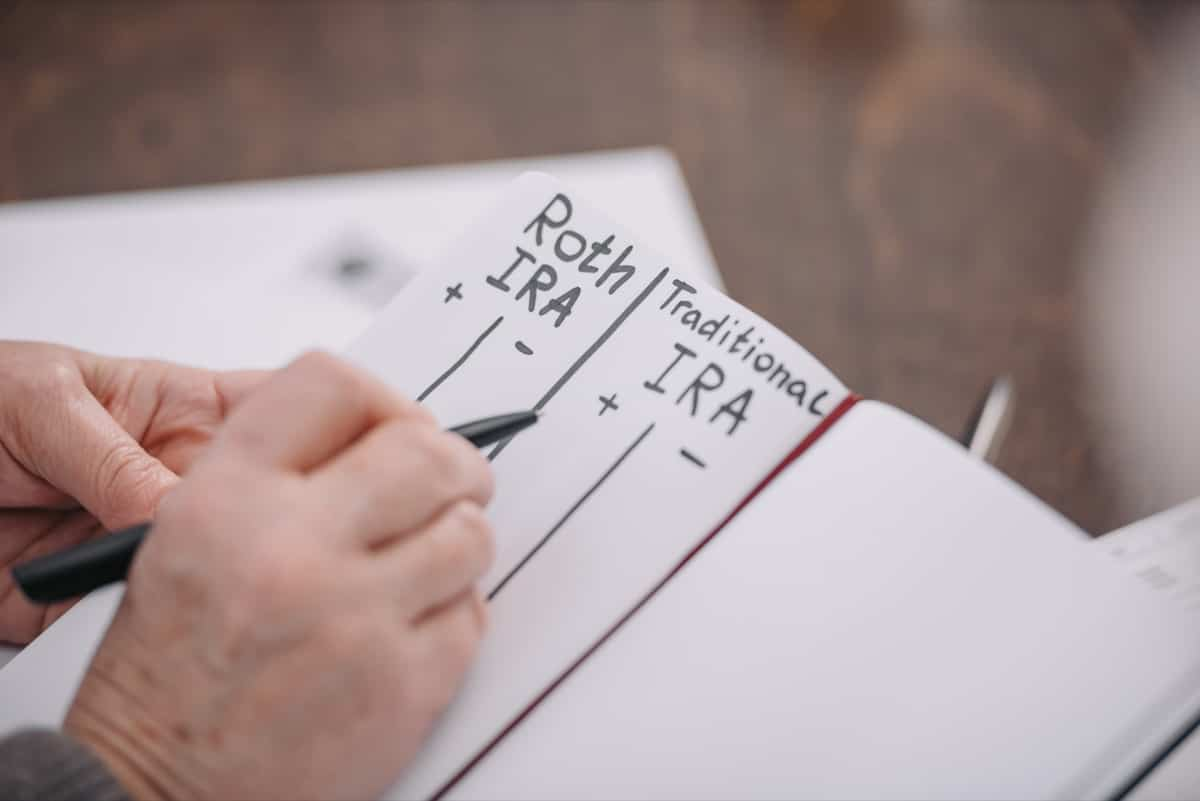When planning for retirement, choosing the right investment vehicle is crucial. In the vast arena of retirement savings options, the Roth IRA emerges as a strong contender. In a Roth IRA vs traditional IRA battle, various factors such as tax benefits, accessibility of funds, and potential for higher returns play pivotal roles in determining which is best suited for an individual’s needs.

On the other hand, like any investment, it also comes with its share of retirement account cons. In the article, we’ll explain essential aspects including the Roth IRA calculator, the benefits comparison of IRA vs. 401k, and the intrinsic advantages and disadvantages of Roth IRAs. This will offer a clear perspective on whether a Roth IRA is superior to other retirement savings options, such as the traditional IRA or employer-sponsored 401k, each with its own set of pros and cons related to 401k.
Pros and Cons of Using a Roth IRA
Advantages of Using a Roth IRA for Retirement Savings
A big plus of having a Roth IRA for retirement is the tax advantage. You put money in after paying taxes, so you don’t get a tax break now, but when you take out the money in retirement, it’s tax-free if you meet certain rules. This aspect can be quite beneficial, as it allows investors to have a clear picture of their retirement savings without worrying about future tax liabilities. Utilizing a Roth IRA calculator can further assist in planning and strategizing the investment to maximize the benefits based on one’s financial situation and goals.
Another benefit is the flexibility and accessibility it offers. Unlike some other retirement savings options, the Roth IRA allows investors to withdraw the contributions (but not the earnings) at any time without penalties or taxes. This can really help when you have unexpected money problems or sudden bills to pay. When comparing Roth IRA vs. traditional IRA or evaluating the benefits of IRA vs. 401k, the Roth IRA generally offers more flexibility, allowing investors to manage their funds with relative ease and convenience.
Disadvantages of Using a Roth IRA for Retirement Savings
While there are several noteworthy advantages, it’s also essential to consider the retirement account cons associated with using a Roth IRA for retirement savings. One of the limitations is the income eligibility criteria. Roth IRAs have income limits, meaning that high earners might not be eligible to contribute.
In case you missed it: The Pros and Cons of Investing in Index Funds

This can be a disadvantage for individuals with higher incomes as it limits their retirement savings options. Another downside is the contribution limit. Roth IRAs, like traditional IRAs, have lower contribution limits compared to employer-sponsored retirement accounts like the 401k.
Tax Benefits of a Roth IRA
The tax benefits of a Roth IRA stand out as one of its most appealing features. Since contributions are made with after-tax dollars, the investment earnings grow tax-free, and qualified withdrawals are also tax-free. The Roth IRA is great, especially if you think you’ll have a higher tax rate when you retire. The tax benefits are a crucial aspect to consider when comparing the IRA advantages over other retirement savings vehicles, such as the 401k pros and cons or the Roth IRA vs traditional IRA.
Flexibility and Accessibility of Funds in a Roth IRA
A Roth IRA provides a significant level of flexibility and accessibility to funds. Contributors can withdraw their contributions (not the earnings) without penalties or additional taxes. This feature is particularly beneficial in times of financial need or emergency, providing a safety net to investors. When analyzing the benefits of IRA vs 401k, the flexibility of the Roth IRA is a substantial advantage, allowing for easier access to funds compared to the restrictions typically associated with a 401k or a traditional IRA.
Potential for Higher Returns in a Roth IRA
Investing in a Roth IRA also holds the potential for higher returns on investment. Investors can choose from many investment options like mutual funds, stocks, and bonds to match their risk tolerance and financial goals. When considering the Roth IRA vs traditional IRA or evaluating the 401k pros and cons, the opportunity to earn higher returns in a Roth IRA due to its diverse investment options is a significant advantage.
Contribution Limits and Income Restrictions of a Roth IRA
Roth IRAs come with specific contribution limits and income restrictions that are essential to consider when planning retirement savings. For the Roth IRA, the contribution limits are comparatively lower than those of employer-sponsored accounts like the 401k. The income restrictions imply that individuals earning above a certain threshold are ineligible to contribute to a Roth IRA.
In case you missed it: 10 Best Startup Business Credit Cards With Bad Credit: How to Get them with this Easiest Application Process

While these limits could disadvantage high-income earners and those looking to contribute larger amounts to their retirement savings, they also keep the Roth IRA accessible to those in varying economic brackets, ensuring that a broader spectrum of people can benefit from its advantages.
Impact on Social Security Benefits with a Roth IRA
A Roth IRA can also have implications on Social Security benefits in retirement. The distributions from a Roth IRA are not counted as taxable income, which can be advantageous as it might reduce the taxable amount of Social Security benefits. In contrast, distributions from Traditional IRAs and 401ks may increase the taxable income, potentially affecting the tax liability on Social Security benefits. Therefore, considering a Roth IRA for retirement savings can be beneficial in optimizing Social Security benefits by potentially reducing the overall taxable income in retirement.
Estate Planning Considerations with a Roth IRA
In estate planning, a Roth IRA holds specific considerations that enhance its appeal. Beneficiaries of a Roth IRA can inherit the funds without facing tax liabilities, given certain conditions are met, such as the five-year holding period. This aspect of a Roth IRA can be significantly advantageous in estate planning, ensuring that heirs receive the benefits without additional tax burdens. Thus, the Roth IRA is a valuable tool in facilitating a smoother and more beneficial wealth transfer process when planning for wealth transition and legacy.
Comparing Roth IRAs to Traditional IRAs for Retirement Savings
Comparing Roth IRAs to traditional IRAs involves evaluating various aspects, such as tax benefits, withdrawal rules, and eligibility criteria. A Roth IRA lets you take out money tax-free when you retire, giving you tax diversification advantages. In contrast, a traditional IRA allows you to deduct your contributions from taxes.
Plus, a Roth IRA doesn’t force you to take out money at a certain age, which a traditional IRA does. Such differences are crucial based on individual financial situations and retirement goals. By comprehensively evaluating the pros and cons of using a Roth IRA against those of a traditional IRA, one can make an informed decision that aligns best with their retirement savings objectives.
Frequently Asked Questions (FAQ) on Roth IRA
What is the Disadvantage of Using a Roth IRA for Retirement Savings?
A disadvantage of using a Roth IRA for retirement savings is its income eligibility criteria; high earners might be ineligible to contribute. Additionally, Roth IRAs have lower contribution limits than employer-sponsored retirement accounts like the 401k.
What are the Pros and Cons of a Roth IRA?
The benefits of a Roth IRA are tax-free retirement withdrawals and no mandatory minimum withdrawals. The cons involve income limitations for eligibility and lower contribution limits compared to employer-sponsored plans like the 401k.
Is a Roth IRA Good for Retirement?
A Roth IRA is great for retirement because it helps with taxes, can earn more money, and lets you take out your money when you need it. However, its effectiveness depends on individual financial circumstances, such as income levels and contribution capabilities.
In case you missed it: The Impact of Interest Rates on Investments: A Beginners Guide

What are the Pros and Cons of a Roth IRA vs 401k?
Roth IRAs offer tax-free withdrawals and no RMDs, whereas 401ks offer higher contribution limits and potential employer matching. However, Roth IRAs have income restrictions, and 401ks have specific withdrawal penalties and rules.
Conclusion
A Roth IRA presents a valuable option for retirement savings, offering benefits such as tax-free withdrawals, no mandatory distribution ages, and flexibility in access to funds. However, it’s essential to consider individual financial circumstances, including income levels and retirement goals, to determine whether a Roth IRA aligns with one’s retirement planning strategy.
- Pet-Tech Startups: Innovations for Animal Lovers
- Tech Repair Services: Meeting the Demand for Gadget Maintenance
- Maximizing Rewards: Smart Credit Card Habits for Cashback and Points
- Ultimate Guide to Making Money from Goat Milk Business
- How to Start an Agricultural Value Added Product Business
- Value-Added Business Ideas for Greenhouse: The Best Ways to Make Profits with Greenhouse Farming
- How to Make Profits with Organic Country Chicken: Best Strategies for Beginners
- 10 Value-added Business Ideas for Millets: Low-investment and Highly Profitable
- Why Cleaning Service Business Becoming More Profitable in Metro Cities in India